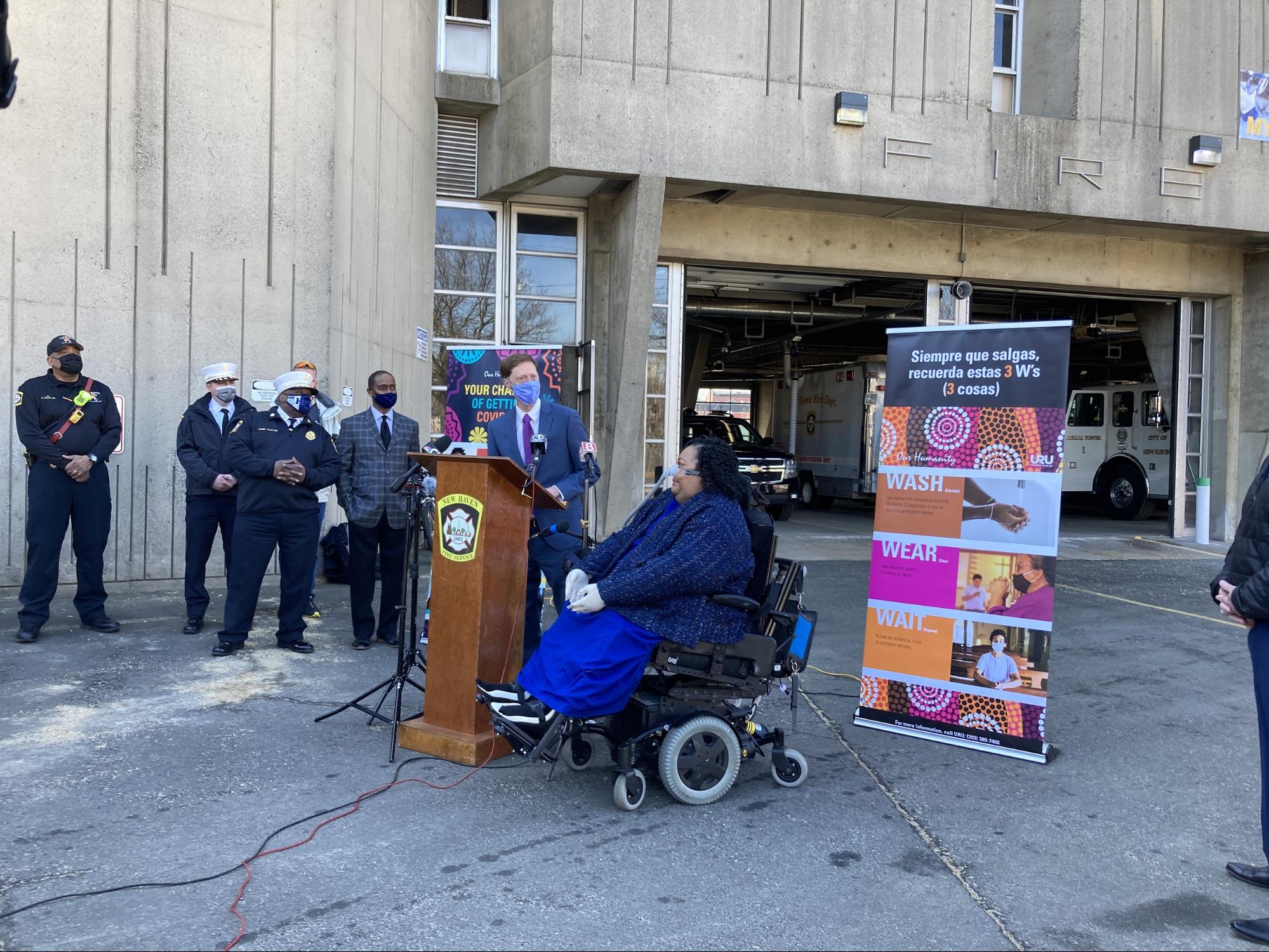
Sylvan Lebrun, Contributing Photographer
On Wednesday morning, about 35 people gathered at the headquarters of the New Haven Fire Department to celebrate the launch of a partnership between the city’s fire stations and the “Our Humanity” public health initiative.
At the launch event, which took place at the Engine 4 fire station on Grand Avenue, two large banners encouraging vaccination were unveiled. Speakers included Our Humanity founder Crystal Emery, Mayor Justin Elicker, NHFD officials and a local pastor. Our Humanity is a nationwide COVID-19 prevention initiative run by the New Haven-based nonprofit URU The Right to Be. The initiative aims to communicate vital public health information to Black, Hispanic and Indigenous communities. Ten fire stations across the city are being launched as “community hubs” for Our Humanity, publicly displaying banners containing COVID-19 risk reduction messaging.
“Keep in mind that it’s not just about you,” said Crystal Emery in her speech at the event. “It’s about our whole community, about the future of our community. And if you don’t get vaccinated, there is no future of our community.”
The large Our Humanity banners created for the fire station campaign contain information on COVID-19 vaccination in both English and Spanish. They depict Black and Hispanic essential workers receiving the vaccine, next to the words “My Hero.”
The banners unveiled at the NHFD headquarters on Wednesday read, “As a leader in your community, your friends and family believe what you say and follow your example. When you get the COVID-19 vaccine, not only do you save your life, but you influence the safety of the lives around you. Please get vaccinated.”
According to the URU press release, financial support from the Yale Community for New Haven Fund was instrumental to the creation of the banners.
In his speech at the event, NHFD Chief John Alston Jr. acknowledged that people of color have reasons to distrust the medical establishment, given past “atrocities” and exploitation. This sentiment was echoed by Bishop Theodore Brooks, pastor of the Beulah Heights First Pentecostal Church, who spoke of the “historical context” behind the Black community’s lack of faith in vaccinations.
However, both Alston and Brooks urged their audience to trust the Centers for Disease Control guidelines and the efficacy of the vaccine.
“40 percent of our work [at the NHFD] is medical, so we’ve seen the devastation that the virus can cause in our communities,” said Alston.
Two other NHFD officials delivered remarks at the event: Assistant Chief Justin McCarthy and Inspector and COVID Task Force Member Douglas Wardlaw.
Our Humanity began to seek out a partnership with the NHFD in January of this year. Emery, the CEO of URU, told the News that she saw fire stations as ideal locations for the Our Humanity banners because of their centrality to various neighborhoods in New Haven and their associations with trust and safety.
“Firehouses are always a safe space. People leave their babies there — when women are in abuse situations, they will physically run to a firehouse,” said Emery in an interview with the News. “You have to meet people where they are. … It doesn’t matter what community you’re talking about; the fire houses are located in the communities.”
At the launch, Emery said that she also feels a personal connection to the NHFD because her father was one of the city’s first Black firemen.
URU The Right To Be is a local nonprofit that aims to “foster communication and understanding among diverse people” by utilizing arts and technology, according to their website. In pre-pandemic times, URU ran campaigns focused on breast cancer prevention and representation of women and racial minorities in STEM.
Emery is an acclaimed documentary filmmaker and author. She lives as a quadriplegic with two chronic diseases — the degenerative nerve disease Charcot-Marie-Tooth and diabetes. Her 2005 documentary “The Deadliest Disease in America,” which focuses on the intersections between structure racism and health care, has received a new wave of attention since the outset of the pandemic.
URU launched the Our Humanity campaign in April of 2020, when Emery noticed the lack of adequate risk communication to the Black, Hispanic and Indigenous communities, which faced the greatest devastation from the COVID-19 pandemic.
According to Emery, the Our Humanity initiative’s first project was creating informational videos that emphasized the importance of the “3 W’s” — washing hands, wearing a mask and waiting 6 feet apart from others. The few dozen videos featured doctors, artists, actors and religious leaders, in addition to “regular folk” impacted by the pandemic.
As case numbers rose, Our Humanity designed banners featuring crucial COVID-19 risk-reduction information and displayed them in prominent locations around cities in Connecticut. After CT Transit became a partner of Our Humanity, buses around the state began to carry these banners as well. The partnership with the NHFD is a continuation of this communication strategy.
“You don’t leave paper resources, because that’s one way to really spread the virus,” Emery said. “People will see our banner, they will see our bus program. … Any study shows you that our subconscious absorbs information through visual communication. When you see somebody that looks like you, you immediately stop to see what it’s about, you identify with them.”
Emery said that she sees the partnership with the NHFD as “just another layer” of a greater campaign to communicate life-saving health information to historically marginalized communities.
In addition to their public messaging campaigns with the NHFD and CT Transit, Our Humanity runs a number of other outreach efforts designed to answer questions that people may have about COVID-19 safety. These include weekly virtual town halls with doctors and a “Lunch and Learn” interview series about the pandemic.
“This is one more initiative that helps build confidence in the community about the vaccine,” Mayor Elicker told the News following the Wednesday launch event. “It ensures that more people in our community, in particular people that are historically distrustful of the health industry, will get vaccinated. And we’re working … to ensure that not only their trust, but the access issues are addressed, and this kind of partnership is vital to making sure that it happens.”
URU The Right To Be was founded in 1995 by a group of artists from New Haven and New York City, including current CEO Emery.
Sylvan Lebrun | sylvan.lebrun@yale.edu









